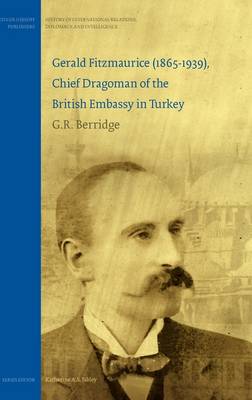History of International Relations, Diplomacy, and Intelligence
1 total work
Gerald Fitzmaurice (1865-1939), Chief Dragoman of the British Embassy in Turkey
by G. R. Berridge
Published 15 July 2007
History of International Relations, Diplomacy and Intelligence, 1 (History of International Relations Library, 1) Gerald Fitzmaurice (1865-1939) served as a dragoman in Constantinople before the First World War. Intriguer, negotiator, intelligence-gatherer, propagandist, and awe-inspiring expert on Ottoman affairs, this feverishly energetic man had exceptional influence with Turkish ministers as well as British diplomatists. Nevertheless, the 'wizard of Stamboul' left no papers or memoirs, and has remained an elusive figure. Drawing on hitherto unexploited archives, including school records and indiscreet private letters retained by others, this biography provides the first full assessment of his impact on events, often thought malign. It also throws light on the history of diplomacy, for Fitzmaurice is one of a long-neglected class: 'ministers of the second order', who paid the bribes, took the risks, and negotiated while ambassadors slept. "An absorbing and scholarly biography. Professor Berridge has made an immense contribution to our understanding both of Anglo-Ottoman relations and of the functioning of the British embassy at Constantinople in the era preceding the Great War."
Keith Hamilton, Senior Editor, Documents on British Policy Overseas, Foreign and Commonwealth Office Historians "Fitzmaurice played a key role in the international diplomacy of the Balkans and the Near East before the First World War. Based on extensive research, G.R. Berridge's lucid biography brings this complex and intriguing man and his world wonderfully to life."
Thomas Otte, Senior Lecturer in History, University of East Anglia Table of Contents 1 Nearly a priest, 1865-91 Intended priest Change of direction Star student interpreter 2 Armenia and Constantinople, 1891-1902 Political consul Anxious to escape the dragomanate The Birejik Commission Desperate to escape the dragomanate 3 Between two fires: the Yemen frontier, 1902-5 Sent to perform miracles Apostate to O'Conor Between two fires Passed over for chief dragoman South-west to the sea Castaway on Perim Island Dark mood in London 4 Chief Dragoman at last, 1906-7 Redeemed by George Lloyd Back to the "Byzantine dungheap" Chief dragoman at last "The beast must go" "Ireland is the bull's eye" End of a winter nightmare 5 Revolution, 1908 Surprised Another new pupil Mixed feelings about the Young Turks In Stamboul after dark for "King Log" 6 "Old regime though not reactionary", 1909-11 Discreet support for counter-revolution "Poisoned arrows" Fighting back Jews and Freemasons: smearing the CUP Business as usual Grey exasperated 7 Troubleshooting in Tripoli, 1911-12 The Italian invasion "We are not well served in Tripoli" Unwelcome guest at the consulate-general Soothing the Italians and reporting the "war" 8 Retreat from Constantinople, 1912-14 "A flicker in the Turkish candle"?
Good offices in the first Balkan War Spectator Fitzmaurice: "The embodiment of the devil" Loss of a patron Armenia again Did he fall or was he pushed? 9 Political warfare, 1914-21 "An expert in questions relating to Arabs" "The most important person in the Eastern Theatre of the War" Bulgaria: "Hours mean Empires now" The nearly man Helping the Zionists No return to Constantinople Throwing in the towel About the Author(s)/Editor(s) G.R. Berridge, Ph.D. (1978) in Politics, University of Durham, is Emeritus Professor of International Politics at the University of Leicester. He has published extensively on the history and theory of diplomacy including Diplomacy: Theory and Practice, 3rd. edition (Palgrave, 2005).
Keith Hamilton, Senior Editor, Documents on British Policy Overseas, Foreign and Commonwealth Office Historians "Fitzmaurice played a key role in the international diplomacy of the Balkans and the Near East before the First World War. Based on extensive research, G.R. Berridge's lucid biography brings this complex and intriguing man and his world wonderfully to life."
Thomas Otte, Senior Lecturer in History, University of East Anglia Table of Contents 1 Nearly a priest, 1865-91 Intended priest Change of direction Star student interpreter 2 Armenia and Constantinople, 1891-1902 Political consul Anxious to escape the dragomanate The Birejik Commission Desperate to escape the dragomanate 3 Between two fires: the Yemen frontier, 1902-5 Sent to perform miracles Apostate to O'Conor Between two fires Passed over for chief dragoman South-west to the sea Castaway on Perim Island Dark mood in London 4 Chief Dragoman at last, 1906-7 Redeemed by George Lloyd Back to the "Byzantine dungheap" Chief dragoman at last "The beast must go" "Ireland is the bull's eye" End of a winter nightmare 5 Revolution, 1908 Surprised Another new pupil Mixed feelings about the Young Turks In Stamboul after dark for "King Log" 6 "Old regime though not reactionary", 1909-11 Discreet support for counter-revolution "Poisoned arrows" Fighting back Jews and Freemasons: smearing the CUP Business as usual Grey exasperated 7 Troubleshooting in Tripoli, 1911-12 The Italian invasion "We are not well served in Tripoli" Unwelcome guest at the consulate-general Soothing the Italians and reporting the "war" 8 Retreat from Constantinople, 1912-14 "A flicker in the Turkish candle"?
Good offices in the first Balkan War Spectator Fitzmaurice: "The embodiment of the devil" Loss of a patron Armenia again Did he fall or was he pushed? 9 Political warfare, 1914-21 "An expert in questions relating to Arabs" "The most important person in the Eastern Theatre of the War" Bulgaria: "Hours mean Empires now" The nearly man Helping the Zionists No return to Constantinople Throwing in the towel About the Author(s)/Editor(s) G.R. Berridge, Ph.D. (1978) in Politics, University of Durham, is Emeritus Professor of International Politics at the University of Leicester. He has published extensively on the history and theory of diplomacy including Diplomacy: Theory and Practice, 3rd. edition (Palgrave, 2005).
